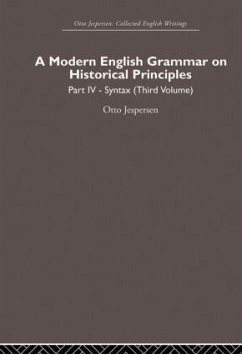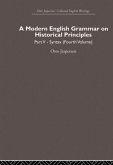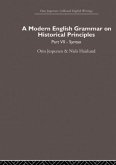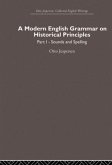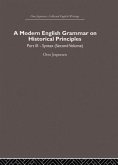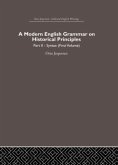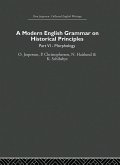- Broschiertes Buch
- Merkliste
- Auf die Merkliste
- Bewerten Bewerten
- Teilen
- Produkt teilen
- Produkterinnerung
- Produkterinnerung
This book was first published in 1954.
Andere Kunden interessierten sich auch für
![A Modern English Grammar on Historical Principles A Modern English Grammar on Historical Principles]() Otto JespersenA Modern English Grammar on Historical Principles72,99 €
Otto JespersenA Modern English Grammar on Historical Principles72,99 €![A Modern English Grammar on Historical Principles A Modern English Grammar on Historical Principles]() Otto JespersenA Modern English Grammar on Historical Principles73,99 €
Otto JespersenA Modern English Grammar on Historical Principles73,99 €![A Modern English Grammar on Historical Principles A Modern English Grammar on Historical Principles]() Otto JespersenA Modern English Grammar on Historical Principles72,99 €
Otto JespersenA Modern English Grammar on Historical Principles72,99 €![A Modern English Grammar on Historical Principles A Modern English Grammar on Historical Principles]() Otto JespersenA Modern English Grammar on Historical Principles71,99 €
Otto JespersenA Modern English Grammar on Historical Principles71,99 €![A Modern English Grammar on Historical Principles A Modern English Grammar on Historical Principles]() Otto JespersenA Modern English Grammar on Historical Principles72,99 €
Otto JespersenA Modern English Grammar on Historical Principles72,99 €![A Modern English Grammar on Historical Principles A Modern English Grammar on Historical Principles]() Otto JespersenA Modern English Grammar on Historical Principles61,99 €
Otto JespersenA Modern English Grammar on Historical Principles61,99 €![English Russian Grammar Or Principles Of The Language English Russian Grammar Or Principles Of The Language]() P. H. ReiffEnglish Russian Grammar Or Principles Of The Language27,99 €
P. H. ReiffEnglish Russian Grammar Or Principles Of The Language27,99 €-
-
-
Produktdetails
- Produktdetails
- Verlag: Routledge
- Seitenzahl: 436
- Erscheinungstermin: 7. Mai 2013
- Englisch
- Abmessung: 234mm x 156mm x 23mm
- Gewicht: 658g
- ISBN-13: 9780415860246
- ISBN-10: 0415860245
- Artikelnr.: 37322593
- Herstellerkennzeichnung
- Libri GmbH
- Europaallee 1
- 36244 Bad Hersfeld
- gpsr@libri.de
- Verlag: Routledge
- Seitenzahl: 436
- Erscheinungstermin: 7. Mai 2013
- Englisch
- Abmessung: 234mm x 156mm x 23mm
- Gewicht: 658g
- ISBN-13: 9780415860246
- ISBN-10: 0415860245
- Artikelnr.: 37322593
- Herstellerkennzeichnung
- Libri GmbH
- Europaallee 1
- 36244 Bad Hersfeld
- gpsr@libri.de
Jens Otto Harry Jespersen, a Danish linguist, specializing in English grammar. Steven Mithen referred to him as "one of the greatest language scholars of the nineteenth and twentieth centuries." Otto Jespersen was born in Randers, Jutland. As a kid, he was attracted by the work of Danish philologist Rasmus Rask, and he taught himself Icelandic, Italian, and Spanish using Rask's grammar. He enrolled in the University of Copenhagen in 1877 at the age of 17, originally studying law but also learning languages. In 1881, he changed his entire concentration to languages, and in 1887, he received his master's degree in French, with English and Latin as secondary languages. In June 1886, Jespersen joined the International Phonetic Association, which was then known as The Phonetic Teachers' Association. In fact, in a letter to Paul Passy, Jespersen proposed the notion of constructing a phonetic alphabet that could be utilized by all languages. From 1887 to 1888, he visited England, Germany, and France, where he met linguists like as Henry Sweet and Paul Passy and attended lectures at universities such as Oxford. On the recommendation of his professor Vilhelm Thomsen, he returned to Copenhagen in August 1888 to begin work on his PhD dissertation on the English case system. He successfully defended his dissertation in 1891.
1. Introductory 2. Present tense 3. Auxiliaries of the perfect and
pluperfect 4. Relations between the present and the perfect 5. Relations
between the perfect and the preferit 6. The pluperfect 7. Tenses of the
verbids 8. Tenses and auxiliaries in the passive 9. Imaginative use of
tenses 10. Imaginative tenses continued 11. Indirect speech 12. The
expanded tenses 13. Expanded tenses continued 14. Expanded tenses concluded
15. Will 16. Will. Continued 17. Shall 18. Shall. Concluded 19. Would 20.
Should 21. Will, shall, would, should in indirect speech 22. Notional suvey
23. Predicatives after particles
pluperfect 4. Relations between the present and the perfect 5. Relations
between the perfect and the preferit 6. The pluperfect 7. Tenses of the
verbids 8. Tenses and auxiliaries in the passive 9. Imaginative use of
tenses 10. Imaginative tenses continued 11. Indirect speech 12. The
expanded tenses 13. Expanded tenses continued 14. Expanded tenses concluded
15. Will 16. Will. Continued 17. Shall 18. Shall. Concluded 19. Would 20.
Should 21. Will, shall, would, should in indirect speech 22. Notional suvey
23. Predicatives after particles
1. Introductory 2. Present tense 3. Auxiliaries of the perfect and
pluperfect 4. Relations between the present and the perfect 5. Relations
between the perfect and the preferit 6. The pluperfect 7. Tenses of the
verbids 8. Tenses and auxiliaries in the passive 9. Imaginative use of
tenses 10. Imaginative tenses continued 11. Indirect speech 12. The
expanded tenses 13. Expanded tenses continued 14. Expanded tenses concluded
15. Will 16. Will. Continued 17. Shall 18. Shall. Concluded 19. Would 20.
Should 21. Will, shall, would, should in indirect speech 22. Notional suvey
23. Predicatives after particles
pluperfect 4. Relations between the present and the perfect 5. Relations
between the perfect and the preferit 6. The pluperfect 7. Tenses of the
verbids 8. Tenses and auxiliaries in the passive 9. Imaginative use of
tenses 10. Imaginative tenses continued 11. Indirect speech 12. The
expanded tenses 13. Expanded tenses continued 14. Expanded tenses concluded
15. Will 16. Will. Continued 17. Shall 18. Shall. Concluded 19. Would 20.
Should 21. Will, shall, would, should in indirect speech 22. Notional suvey
23. Predicatives after particles

